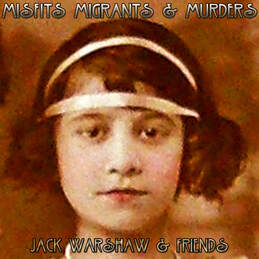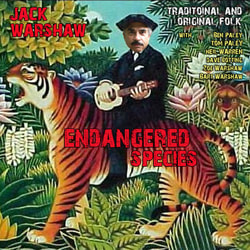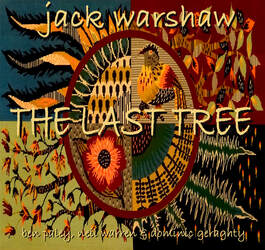Life and career
Jack defies categories. He sings real folk songs in real folk styles but writes our times, passions and dreams too. He learns from oral tradition but is not a scholar. He respects his sources. He's earned respect too, in the Encyclopaedia of Appalachia for "Payday at Coal Creek." An engaging, veteran performer with a fresh, modern outlook and a keen sense of social justice. He lives in Hampshire, UK, works with other musicians and solo.
Raised in New York City by liberal parents, Jack's artistic and musical ability showed in childhood. At the famous High School of Music and Art, (Now LaGuardia) his artistic ability turned towards architecture. At 16 he was attending Greenwich Village folksong sessions, concerts by The Weavers and playing guitar. At university in Ohio, he co-founded its first Folk Club, hosting weekly "hootenannies," organizing talent shows, festivals and concerts. He formed a trio, The Wanderers, modeled on The Weavers, met lifelong friend and music accomplice Stuart Burns. Learning was from early recording and performers like Pete Seeger, The Weavers, Peggy Seeger and Ewan MacColl, The New Lost City Ramblers, Tom Paley, Dave Van Ronk, Doc Watson and the Carter Family. He formed a duo with Kathy Davis. and joined young hopefuls like Bob Dylan, Peter Paul and Mary, Judy Collins and others at New York's Gerdes Folk City's open sessions. Spotted at the legendary Bitter End in Greenwich Village by music agent Peter Paul, they performed alongside then aspiring Jose Feliciano, the Mamas and the Papas and Happy Traum followed and were mentored by Ed McCurdy.
Jack moved to London and joined The Critics Group, the left wing folk/theatre group led by Ewan MacColl. Resisting conscription, he started writing songs, opposing the Vietnam war. while co-founding the Stop it Committee, the UK American Anti-war Group. The Critics Group split up in 1973 and the Stop it Committee disbanded after US withdrawal from Vietnam in April 1975.
In 1973 he co-founded Combine Theatre with former Critics Group members and performed in themed programmes at The Knave of Clubs, Bethnal Green. He wrote a multi media show about Sacco and Vanzetti around Woody Guthrie's 1951 Folkways album and worked with Sandra Kerr, performing at schools, songwriting workshops, concerts, political and union events and benefits. Meanwhile he co-wrote and performed Combine's Vietnam Victory Show, at the ASLEF hall in April 1975, following the liberation of Saigon.
From his early days in London he worked with BBC Radio Ballad producer Charles Parker,(a member of the Critics Group) Peggy Seeger and others, making anti-war radio programmes intended for broadcast to Vietnam GIs. Entitled "Off Limits," the programmes featured original songs and interviews with American deserters, critics, contemporary news clips, a Vietnamese girl, survivor of the 1969 My Lai Massacre and the US television interview by journalist Mike Wallace of Lt. William Calley, who was convicted for ordering the massacre. By then, the FBI had marked him as a fugitive for resisting conscription, refusing to renew his passport. With Jimmy Carter's amnesty in January 1977, his passport was restored.
From 1966 to 1973 while working with Critics Group members on projects including MacColl's Festival of Fools, he formed a duo with singer/actor Carol (Buff) Rosenthal. They toured the UK until 1974. He then supporting the Chile Solidarity and Human Rights campaigns after the 1973 Chile coup, writing "We Will Fight" and performing at many benefits alongside Chilean groups such as Karaxu.
He was a resident singer and organizer at MacColl's Singers Club Folk club, 1967–85; West London Folk Club, 1970–75; Knave of Clubs, 1973-82 and Court Sessions, 1980–90. He recorded his first album "Long Time Gone" in 1979, re-releasing it in 2010, which included one of the great protest songs of our ti me, "If They Come in the Morning." Retitled "No Time for Love" by Christy Moore it remains widely heard and sung.
In 1978 he and Kerr recorded an album with South African exile Barry Gilder, made up primarily of Gilder's (now former South African Director of Intelligence) freedom songs and two songs by MacColl and Peggy Seeger. Smuggled into South Africa, immediately banned but distributed clandestinely, it became popular amongst freedom fighters. Around that time Jack produced and performed in a series of programmes in the UK and Ireland supported by the US Embassy cultural section. In 1979 he toured Republican venues in the North of Ireland with singer Breege Keenan.
As an Architect, Jack became an expert in historic conservation, dividing his time between that and singing at benefits and festivals. He gave concerts at his Union branch and Whitwell Colliery village in support of the 1984/5 miners strike. Rejoining his old friend Stuart Burns led to touring in the UK and US, many new songs, a new following and several albums.
Jack lives in Hampshire with his wife Jane, a social scientist and planner. Their three children are musical and work in the arts. Now in his 8th decade, Jack's repertoire and songwriting continues to focus on events great and small, funny and profound, love songs and stories, political events like Vietnam, 9/11, the Miners Strike, government snooping, Michael Brown, Charlie Hebdo, disasters like the Moore Oklahoma tornado, Brexit, our Planet, US and UK politics, and celebrating heroes like Pete Seeger.
Jack defies categories. He sings real folk songs in real folk styles but writes our times, passions and dreams too. He learns from oral tradition but is not a scholar. He respects his sources. He's earned respect too, in the Encyclopaedia of Appalachia for "Payday at Coal Creek." An engaging, veteran performer with a fresh, modern outlook and a keen sense of social justice. He lives in Hampshire, UK, works with other musicians and solo.
Raised in New York City by liberal parents, Jack's artistic and musical ability showed in childhood. At the famous High School of Music and Art, (Now LaGuardia) his artistic ability turned towards architecture. At 16 he was attending Greenwich Village folksong sessions, concerts by The Weavers and playing guitar. At university in Ohio, he co-founded its first Folk Club, hosting weekly "hootenannies," organizing talent shows, festivals and concerts. He formed a trio, The Wanderers, modeled on The Weavers, met lifelong friend and music accomplice Stuart Burns. Learning was from early recording and performers like Pete Seeger, The Weavers, Peggy Seeger and Ewan MacColl, The New Lost City Ramblers, Tom Paley, Dave Van Ronk, Doc Watson and the Carter Family. He formed a duo with Kathy Davis. and joined young hopefuls like Bob Dylan, Peter Paul and Mary, Judy Collins and others at New York's Gerdes Folk City's open sessions. Spotted at the legendary Bitter End in Greenwich Village by music agent Peter Paul, they performed alongside then aspiring Jose Feliciano, the Mamas and the Papas and Happy Traum followed and were mentored by Ed McCurdy.
Jack moved to London and joined The Critics Group, the left wing folk/theatre group led by Ewan MacColl. Resisting conscription, he started writing songs, opposing the Vietnam war. while co-founding the Stop it Committee, the UK American Anti-war Group. The Critics Group split up in 1973 and the Stop it Committee disbanded after US withdrawal from Vietnam in April 1975.
In 1973 he co-founded Combine Theatre with former Critics Group members and performed in themed programmes at The Knave of Clubs, Bethnal Green. He wrote a multi media show about Sacco and Vanzetti around Woody Guthrie's 1951 Folkways album and worked with Sandra Kerr, performing at schools, songwriting workshops, concerts, political and union events and benefits. Meanwhile he co-wrote and performed Combine's Vietnam Victory Show, at the ASLEF hall in April 1975, following the liberation of Saigon.
From his early days in London he worked with BBC Radio Ballad producer Charles Parker,(a member of the Critics Group) Peggy Seeger and others, making anti-war radio programmes intended for broadcast to Vietnam GIs. Entitled "Off Limits," the programmes featured original songs and interviews with American deserters, critics, contemporary news clips, a Vietnamese girl, survivor of the 1969 My Lai Massacre and the US television interview by journalist Mike Wallace of Lt. William Calley, who was convicted for ordering the massacre. By then, the FBI had marked him as a fugitive for resisting conscription, refusing to renew his passport. With Jimmy Carter's amnesty in January 1977, his passport was restored.
From 1966 to 1973 while working with Critics Group members on projects including MacColl's Festival of Fools, he formed a duo with singer/actor Carol (Buff) Rosenthal. They toured the UK until 1974. He then supporting the Chile Solidarity and Human Rights campaigns after the 1973 Chile coup, writing "We Will Fight" and performing at many benefits alongside Chilean groups such as Karaxu.
He was a resident singer and organizer at MacColl's Singers Club Folk club, 1967–85; West London Folk Club, 1970–75; Knave of Clubs, 1973-82 and Court Sessions, 1980–90. He recorded his first album "Long Time Gone" in 1979, re-releasing it in 2010, which included one of the great protest songs of our ti me, "If They Come in the Morning." Retitled "No Time for Love" by Christy Moore it remains widely heard and sung.
In 1978 he and Kerr recorded an album with South African exile Barry Gilder, made up primarily of Gilder's (now former South African Director of Intelligence) freedom songs and two songs by MacColl and Peggy Seeger. Smuggled into South Africa, immediately banned but distributed clandestinely, it became popular amongst freedom fighters. Around that time Jack produced and performed in a series of programmes in the UK and Ireland supported by the US Embassy cultural section. In 1979 he toured Republican venues in the North of Ireland with singer Breege Keenan.
As an Architect, Jack became an expert in historic conservation, dividing his time between that and singing at benefits and festivals. He gave concerts at his Union branch and Whitwell Colliery village in support of the 1984/5 miners strike. Rejoining his old friend Stuart Burns led to touring in the UK and US, many new songs, a new following and several albums.
Jack lives in Hampshire with his wife Jane, a social scientist and planner. Their three children are musical and work in the arts. Now in his 8th decade, Jack's repertoire and songwriting continues to focus on events great and small, funny and profound, love songs and stories, political events like Vietnam, 9/11, the Miners Strike, government snooping, Michael Brown, Charlie Hebdo, disasters like the Moore Oklahoma tornado, Brexit, our Planet, US and UK politics, and celebrating heroes like Pete Seeger.


